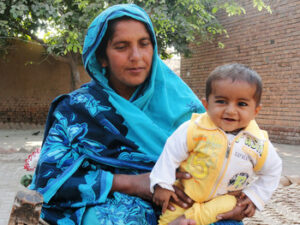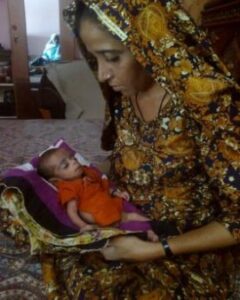NO CHILD BORN TO DIE

Every year, 432,000 children under-five die in Pakistan, over two thirds of whom die within their first month of life. Access to health care varies dramatically; the risk of a newborn baby from one of the poorest families dying (63 per 1,000) is almost double the rate from the richest families (38 per 1,000).
Two thuds of the population live in rural areas where neonatal morality is twice as high as in urban areas. Just 1% of government spending was allocated for healthcare in 2009, whilst the country’s private healthcare system is beyond the reach of the majority of Pakistani families.
A typical district with health infrastructure in rural Pakistan comprises of basic health units, rural health centres and a referral hospital. In rural settings, staffing levels are inadequate and referral system function poorly 70% of births take place inside the home as basic health units are closed after 2pm and many lack trained medical staff.
The Umerkot Child Survival Project focused on three Union Councils in rural Sindh province in these locations:
- Preventable and treatable diseases such as pneumonia, tuberculosis and malaria are the main cause of child deaths.
- Only 37% of infants are fully immunised.
- Only 4% of pregnant women receive antenatal care at a health facility.
- 70% of births take place in the community, overseen by an unskilled birth attendant.
Project annual structure:
- Year one: April 2010 - March 2011.
- Year two: August 2011 - July 2012
- Year three: August 2012 - July 2013
The project was interrupted between years one and two due to the devastating flooding that affected thousands of families in Sindh province in 2010.
The Charitable Trust with Save the Children has been able to reach:
- 17,330 Children under the age of five.
- 19,048 women of reproductive age
Through our advocacy activities, we anticipated that district level authorities would replicate activities profiled by our work, reaching a further estimated 203,848 women of reproductive age, 145,606 children under the age of five and 400 Female Health Workers.
The main aim of the project was to reduce child mortality by 30% in the target areas.
We planned to achieve this through three objectives:
- Increasing the utilisation of maternal, newborn and child health services by 30%
- Improving the knowledge and practice of mothers and primary carers on key maternal, newborn and child health practices and danger signs of life-threatening childhood illnesses.
- Advocating for the placement of key health staff and availability of essential lifesaving supplies and equipment at all target public healthcare facilities in Umerkot.
Over the three year project, dramatic progress has been made to transform healthcare in Umerkot and we are exceptionally pleased with the results:
- The project directly reached over 18,500 children, exceeding its target.
- Estimates suggest that we directly reached over 60,000 women - significantly more than the 19,048 initially planned.
- Our final assessment shows very promising progress, including: a 19% increase in antenatal visits; 46% of women visiting public sector facilities compared to 16% in the baseline study; 89% of women being vaccinated twice against tetanus compared to 64% during the baseline study; and a 38% increase in patients visiting public health facilities in project intervention areas. This progress should have a long lasting effect on health services and the lives of mothers and children in the district.
How we achieved our goals:
Training over 200 Traditional Health Attendants and Community Health Workers and providing refresher training throughout the project.
Providing training for Female Health Workers who gave on-going care to over 2,800 babies and mothers during the first month after birth.
Surpassing our target of increasing the skulls and knowledge of 20 facility-based health staff. The training covered a range of topics, including: counselling skills; antenatal care; and the causes of (and precautionary measures around) vaginal bleeding.
Distributing 3,527 clean delivery kits to Traditional Health Attendants and Female Health Workers in the district. These will help provide a clean, safe environment in which mothers can give birth.
Providing essential emergency drugs and equipment to five health facilities in the district
Supporting women's support groups and Village Health Committees who in turn, reached over 10,000 people each year with messages around positive health.
Producing a range of local language materials to promote health practices in the district.
Engaging key stakeholders at various levels (both from government and other organisations) with the project.
ZAMAN ALI'S STORY:
Gulnaz lives in the village of Khan Banglani, which is situated in the west of Umerkot. Gulnaz gave birth to a premature baby, Zamin Ali, who, at the time of birth, was dangerously underweight, weighing less than albs.
Thankfully, because of your project, Female Health Worker Farzana visited mother and baby on a regular basis and gave life-saving advice on how to care for a Zamin.
Fazana advised Gulnaz on breast feeding, keeping the baby warm, delayed bathing and skin-to-skin contact. Zamin is now slowly gaining weight and his mother is delighted with progress.


